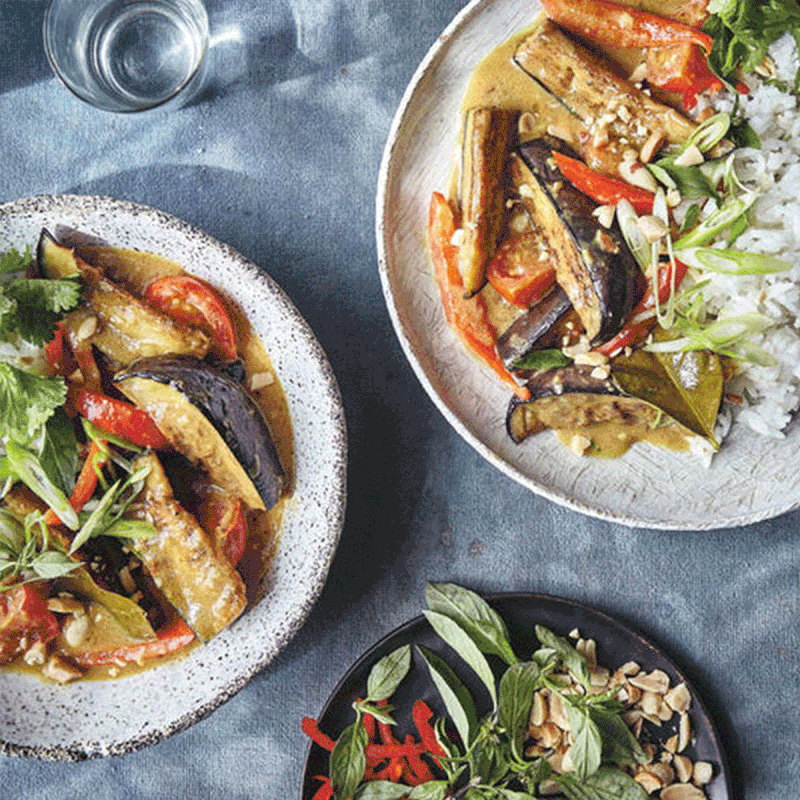
10 Excellent Meat-Free Meals To Make At Home
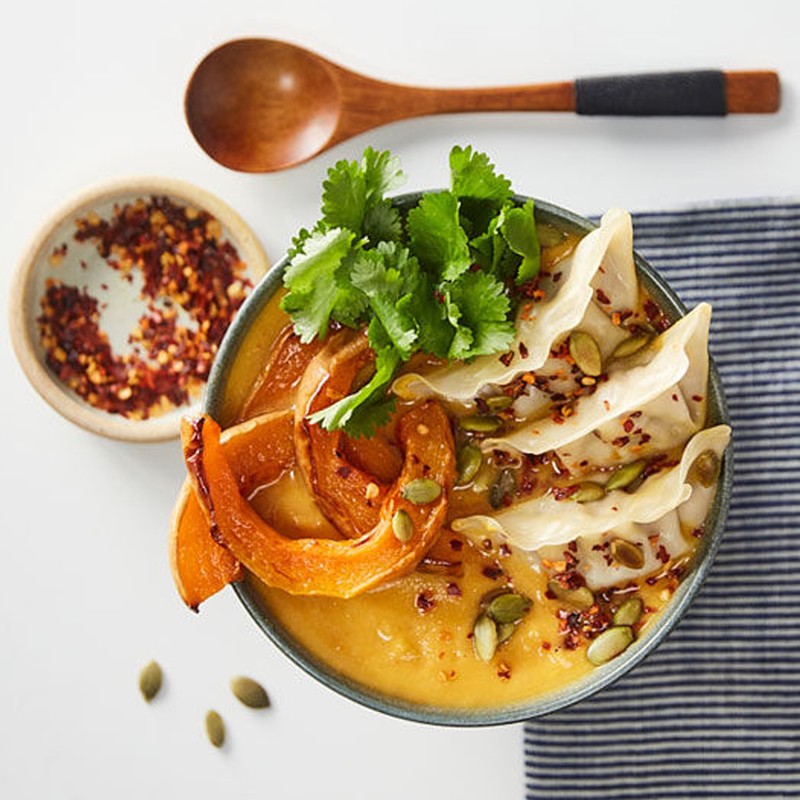
Butternut Squash Miso Soup With Vegetable Gyoza
Itsu
On a chilly evening, there's still nothing better than a warming soup. This miso version has an added Asian twist in the form of vegetable gyoza, for extra flavour.
Pre-heat the oven to 200°C and line a baking tray with a piece of baking paper.
Wash the squash and cut it into 1cm slices (half-moons). Place on the lined tray and mix with the half the olive oil and season with salt and pepper. Bake for about 25-30 minutes, until caramelised and soft. Make sure to turn the pieces halfway through cooking.
Heat the rest of the oil in a pan, add the diced shallots, chopped garlic, ginger and chilli flakes. Continue to cook for around 5 minutes until the shallots are soft.
Leave the two roasted squash slices for garnish. In a pan, combine the rest of the roasted squash with the shallot mix, water and miso. Bring to the boil and puree until smooth using a hand-blender.
Steam cook the gyoza as per packet instructions.
To plate up place a ladle of the miso butternut soup in a bowl, divide and place the vegetable gyoza onto the soup, garnish with remaining roasted squash slices, pumpkin seeds, chilli flakes and coriander.
Visit Itsu.com
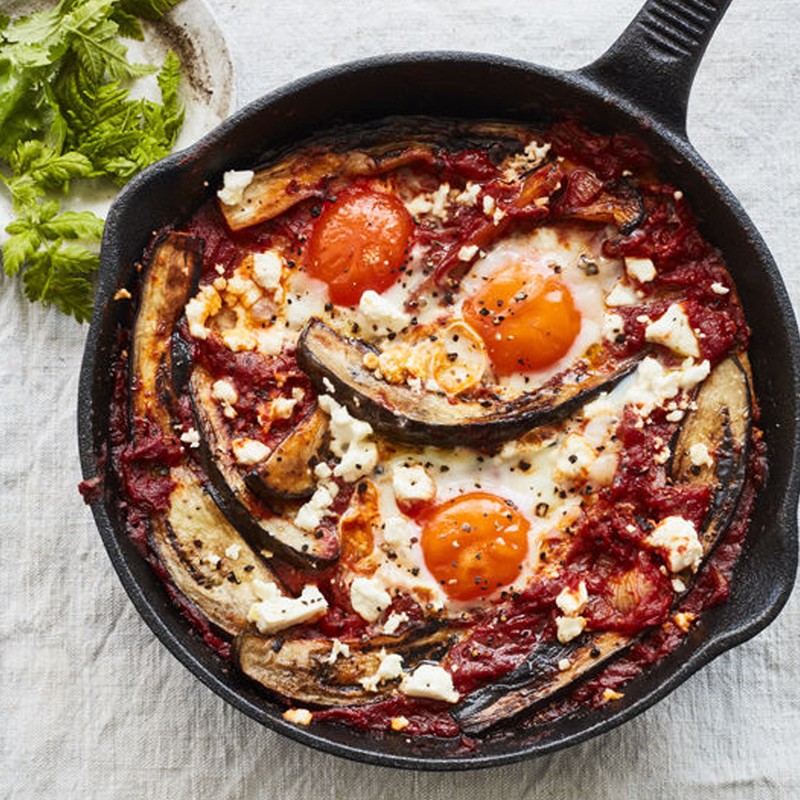
Smoky Aubergine Shakshuka
Theo Michaels, Share
Perfect as a veggie-rich weekend brunch dish, but just as delicious for an easy, mid-week supper, this aubergine shakshuka ticks all the boxes. Just be sure to serve with toasted sourdough to mop up all the juices.
Preheat the oven to 200°C/Gas mark 6.
Cut the aubergine in half lengthways, then quarter each half to create eight full-length wedges. Fry the aubergine wedges in a hot ovenproof frying pan/ skillet with a generous glug of olive oil for 5 minutes on each side, until browned. Remove them from the pan and set aside.
Add the onion to the pan with a little more olive oil and fry for 5 minutes, then add the garlic and cook for 1 minute more. Add the ras el hanout, smoked paprika, tomato purée and sugar and stir in. Follow with the tomato passata and season well with salt and pepper. Arrange the aubergine/eggplant wedges in the sauce and leave to simmer for 5-10 minutes, after which time taste the sauce, adjust the seasoning to taste and remove the pan from the heat.
Make six small gaps in between the curled aubergine wedges and crack the eggs, allowing a little of the white to fall away, then pour the eggs into the gaps. Sprinkle over half the feta, drizzle with olive oil and place the pan in the preheated oven for 7 minutes for medium-cooked eggs.
Remove from the oven, drizzle with a little more olive oil, scatter over the coriander, remaining feta and chilli slices and add a pinch of salt. Serve with toasted sourdough bread on the side to mop up the juices.
Visit Waterstones.com
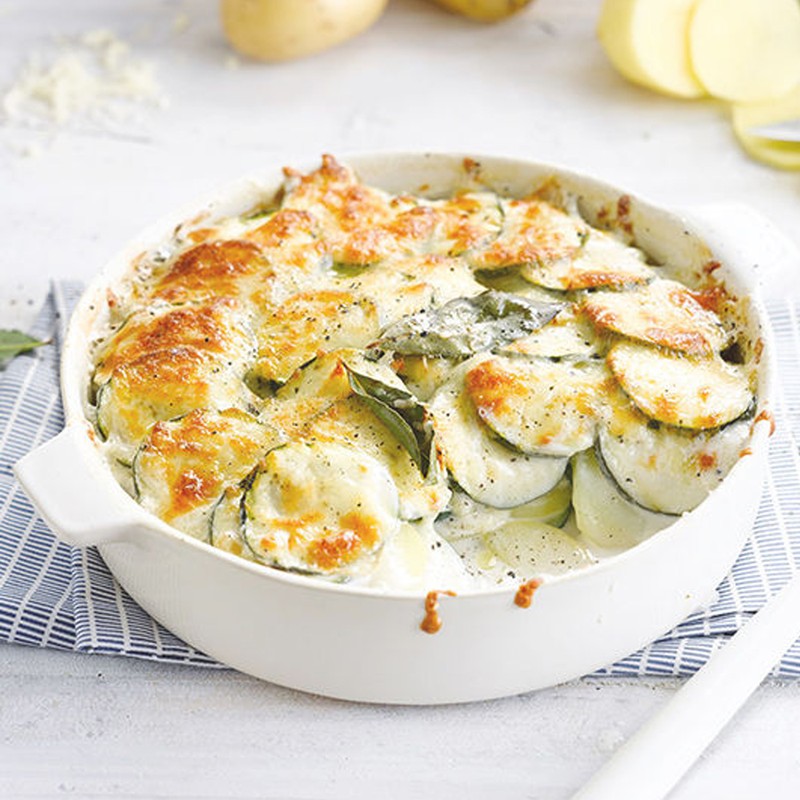
Potato & Courgette Dauphinoise
Alpro
Start by pre heating your oven to 200°C, then warm the Alpro Soya drink together with the Alpro Soya Single, bay leaves and crushed garlic. Take the pan off the heat once it comes to the boil.
Peel the potatoes and the courgette and thinly slice. Meanwhile, grease a baking dish with olive oil.
Arrange a layer of potatoes on the bottom of the baking dish and season with pepper and a small pinch of salt. Then, alternate layers of courgette slices and potato slices, seasoning every layer as you go and finishing with a layer of courgette. Pour over the creamy sauce mixture until 2/3 of the veggies are covered.
Sprinkle grated cheese over the top and bake for 35-40 minutes until the potatoes are tender and the top nicely golden.
Visit Alpro.com
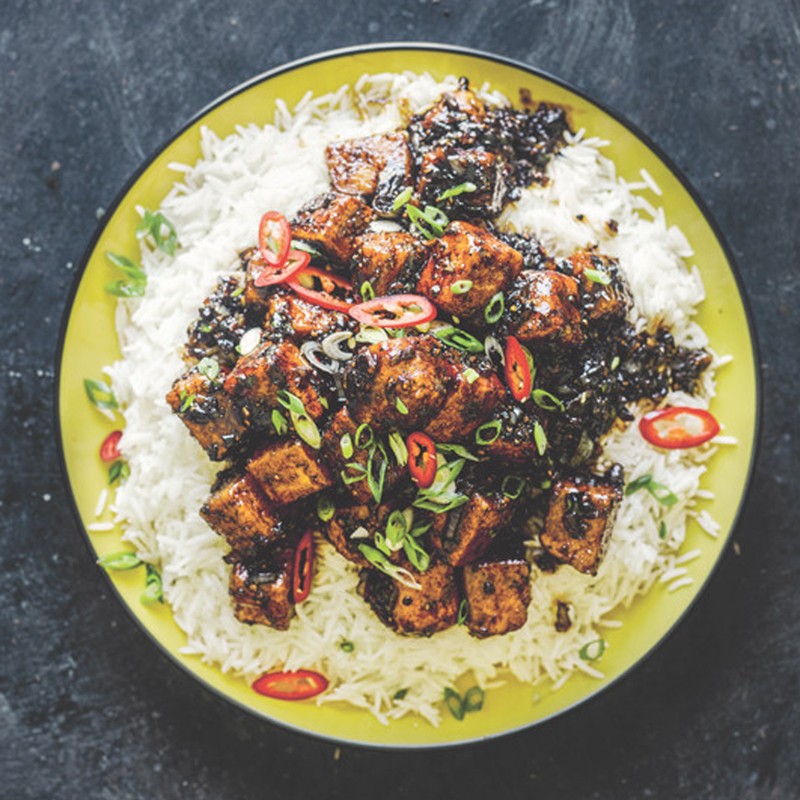
Black Pepper Tofu
Ben Lebus, Mob Kitchen
Such a delicious dish and a great way to use up any leftover black pepper. Taste the tofu at the end. If it’s too sugary, add a bit more pepper. If it’s too peppery, add a bit more sugar. Get that balance right.
Chop the tofu into cubes. Coat in cornflour.
Add some vegetable oil to a wok. Fry the tofu until browned and remove from the wok.
Get the rice on (follow the instructions on the packet).
Clean the wok and place over a medium heat. Add a splash of oil. Add 4 tablespoons of butter, along with the chopped onion, finely chopped garlic and a large piece of fresh ginger.
Fry until everything is soft. At this point, add 2 tablespoons crushed black peppercorns and 2 tablespoons white sugar. Stir them in. Once the sugar has dissolved, add 5 tablespoons each of light and dark soy sauce.
Stir it all together, and then add a chopped red chilli and 3 chopped spring onions. Stir, and then re-add your tofu. Stir it in, add another tablespoon of butter, allowing it to melt, then remove the tofu from the heat.
Serve the tofu on top of a mound of steaming rice, garnish with another chopped spring onion and enjoy!
Visit Waterstones.com
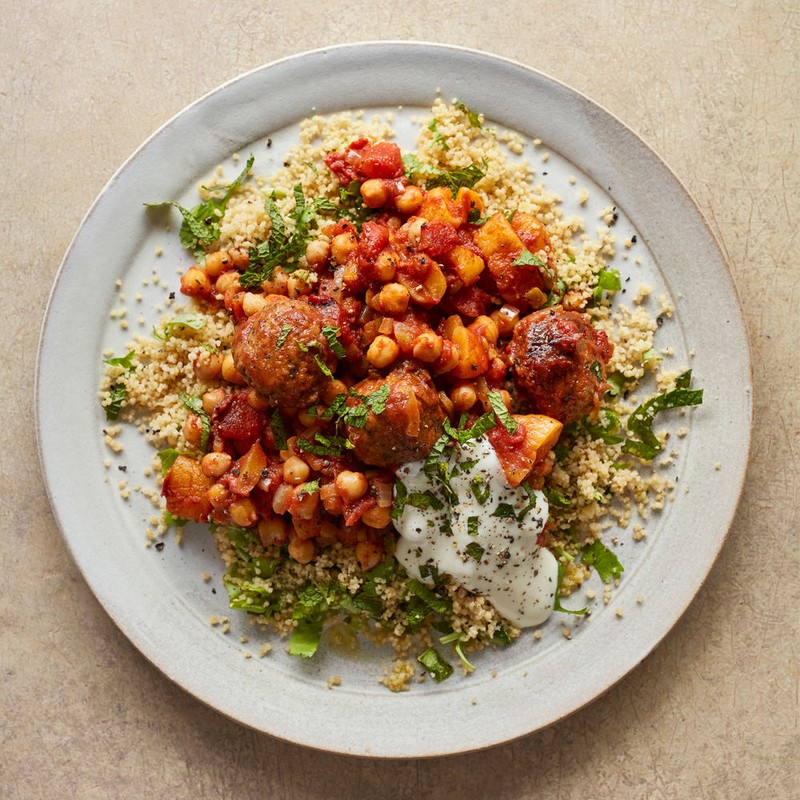
Moroccan Veggie Meatballs With Chickpeas & Couscous
Waitrose
These Moroccan-inspired veggie meatballs make for an ideal cosy supper on a chilly evening. Add feta for an extra kick or keep the recipe as it is if you're catering for vegans.
Preheat the oven to 180°C/Gas mark 4. Heat the oil in a large flameproof casserole dish over a medium-high heat.
Fry the onion and garlic for 5 minutes, then stir in the ras el hanout and fry for 2 more minutes. Add the tomatoes, chickpeas, apricots and 250ml hot vegetable stock; bring up to a simmer and cook for 3-4 minutes. Stir in the vegetarian meatballs, then put the dish in the oven for 20 minutes.
Meanwhile, prepare the couscous. Put in a bowl and add the remaining 250ml of hot vegetable stock; cover with a plate and set aside for 15 minutes. Serve the couscous with the vegetarian meatballs, herbs and a spoonful of yogurt alternative.
Visit Waitrose.com
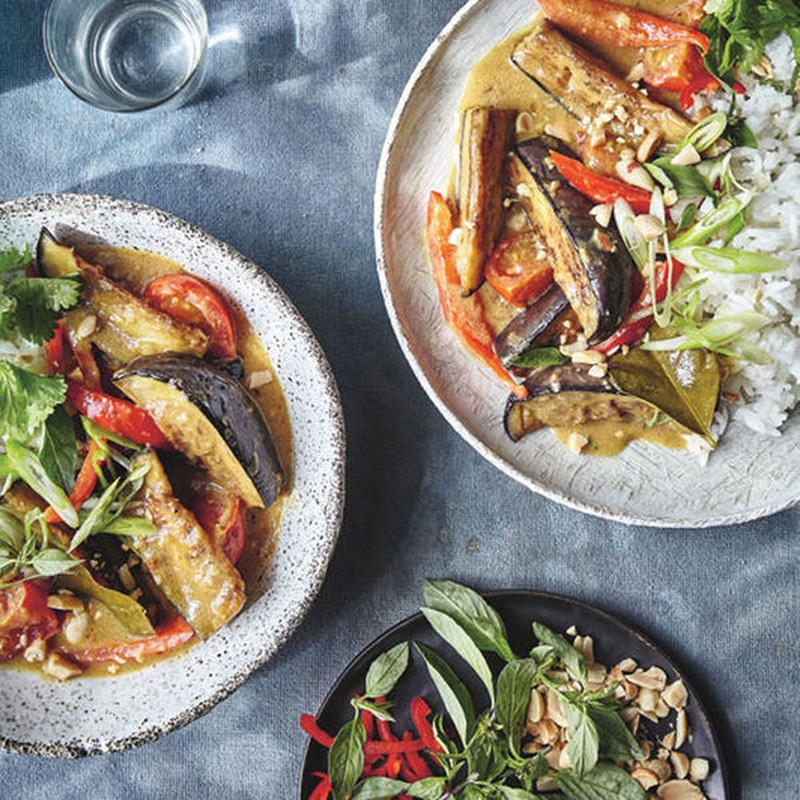
Aubergine & Peanut Curry
Annie Rigg, Eat More Veg
The ingredients list for this flavour-packed dish may look long, but it actually consists mostly of store cupboard items. Thai fish sauce is now available in vegan form – look online or in Asian supermarkets – if you can’t find it, add a dash of soy sauce and a squeeze of lime juice.
Tip the cumin and coriander seeds into a large dry sauté pan and toast over a medium heat for 30 seconds to a minute until they smell aromatic. Grind the seeds using a pestle and mortar, and set aside.
Cut the aubergines in half from end to end, cut again across the middle, and then into wedges. Heat half of the sunflower oil in the sauté pan and fry half of the aubergines over a medium heat until golden brown all over. You may need to do this in smaller batches depending on the size of your pan.
Remove the aubergines from the pan and cook the remaining aubergine in more oil. Remove from the pan and set aside.
Tip the garlic, ginger, lemongrass, chilli, and turmeric, along with the cumin and coriander seeds, into a food processor, and blend until combined into a paste.
Heat the coconut oil in the sauté pan, add the paste mixture and cook for 1 minute. Add the coconut milk, vegetable stock, peanut butter, lime leaves, tamarind paste, fish sauce and sugar, and simmer gently for 10 minutes to reduce and thicken slightly. Add the tomatoes to the pan and cook for 5 minutes until tender but still holding their shape.
Deseed the pepper, cut into 1cm wide strips and add to the pan with the aubergines and half of the Thai basil leaves. Mix gently to combine, and continue to cook for about 15 minutes until the vegetables are tender.
Serve the curry topped with the chopped peanuts, spring onions, coriander and remaining Thai basil, with bowls of jasmine rice.
Visit Waterstones.com
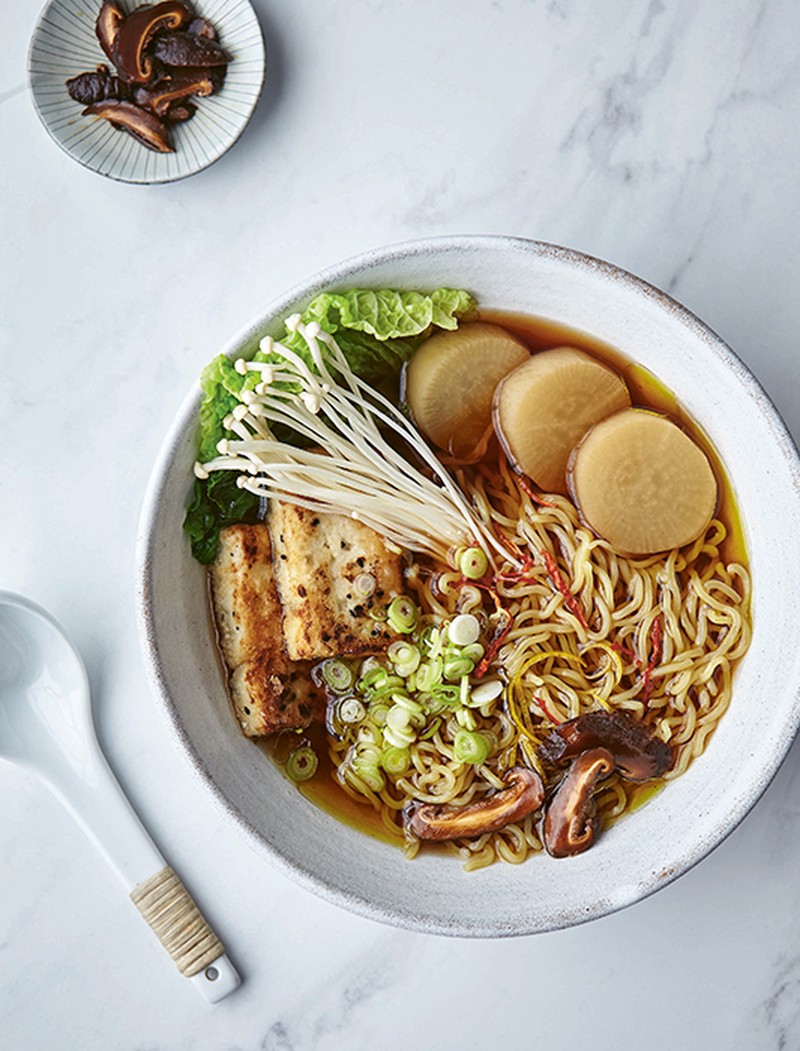
Mushroom Dashi Ramen With Vegetables & Fried Tofu
Tim Anderson, Vegan JapanEasy
Put the tofu into a small bowl and pour the sake over. Mix together the cornflour and sesame seeds, then carefully cover the tofu in the cornflour mixture, ensuring it is evenly coated.
Heat 2 tbsp of oil in a non-stick frying pan over a medium-high heat and cook for a few minutes on each side, until the tofu is golden brown and crisp. Drain on paper towels and set aside.
Purée the 100 ml of oil, nori and salt together in a food processor until the seaweed is completely pulverised. Leave the oil to settle while you prepare the rest of the dish.
Bring the dashi, soy sauce and mirin to the boil in a saucepan, then add the daikon rounds. Reduce the heat to a high simmer, place a lid on the pan and cook until the daikon is tender, about 10 minutes. Remove the daikon with a slotted spoon and reserve. If you’re using shimeji mushrooms, boil them in the dashi for a couple of minutes, then remove and reserve (the enoki don’t need cooking). Keep the dashi at a low simmer with a lid on the pan.
Bring a large pan of water to the boil and blanch the cabbage for 1 minute, then remove with a slotted spoon and reserve.
Let the water come back to the boil and cook the ramen until al dente, according to the packet instructions. Drain very well.
Divide the ramen among four deep bowls, pour over the mushroom dashi and toss the noodles with chopsticks to ensure they aren’t stuck together. Top with the cabbage, daikon, mushrooms, tofu, spring onions, chilli shreds and lemon or yuzu zest. Finally, add a generous spoonful or two of the nori oil to the surface of the broth. Enjoy immediately.
Visit Waterstones.com
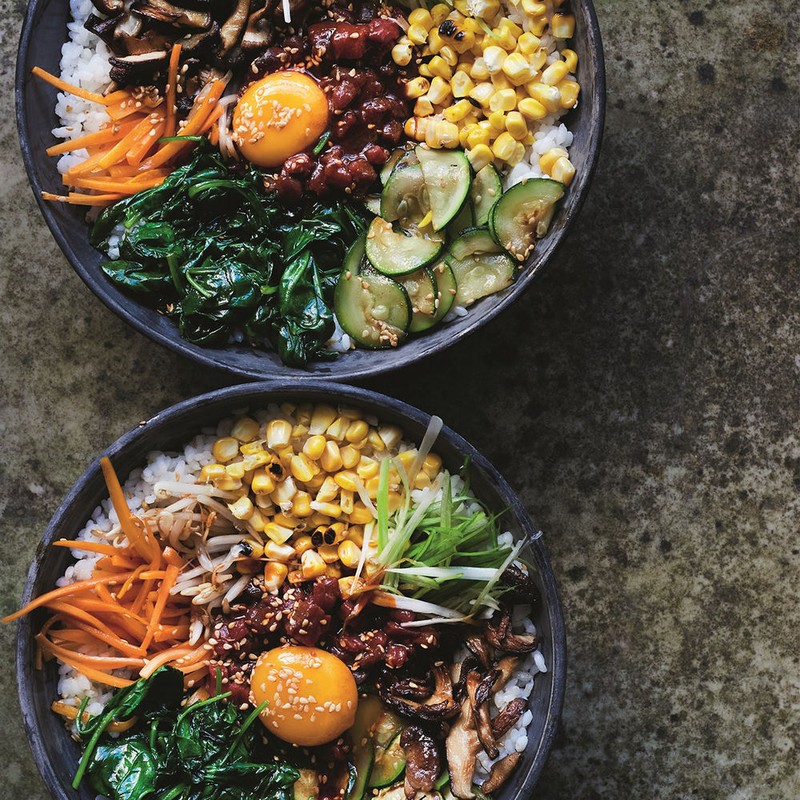
Bibimbap
Gizzi Erskine, Restore
In a bibimbap bowl, rice is topped with vegetables, meat (optional), egg yolk and a spicy sauce and by the time the rice gets to the table it has a fantastic caramelised crust. Bibimbap is delicious, healthy and a great way to tackle a fridge forage. These are traditional toppings, but you can play around with seafood, tofu and different veg: the only mainstays are the rice, egg yolk and sauce.
Put the rice and water in a large saucepan with a good pinch of salt. Cover, bring to a simmer and cook for 12 minutes. Take off the heat and steam (lid on) for 10 minutes.
Gently heat the sauce ingredients in a small saucepan until emulsified. Set aside.
Mix together the sesame and sunflower oils. Heat a large wok or frying pan over a high heat, add 1 tbsp of the oil mix and add half the spinach with a pinch of salt. Cook briefly until wilted, then remove and drain on kitchen paper, squeezing out any liquid. Repeat with the remaining spinach. Add another splash of oil and briefly fry the courgette until golden. Remove and set aside. Repeat this process with the carrot, beansprouts, spring onions and shiitake mushrooms. Rub the sweetcorn cob with oil, salt and pepper, then brown in the pan until the kernels start to char.
Heat two stone bibimbap dishes or a wok on the hob until smoking hot. Place the stone dishes on a heatproof surface (if using). Brush the insides of the dishes (or hot wok) with the remaining oil and add the rice. Group vegetables around the edge, put the raw meat in the middle, then the egg yolks and 2 tbsp of the sauce for each serving. Top with sesame seeds. Mix the sauce into the rice at the table with a spoon.
Visit Waterstones.com
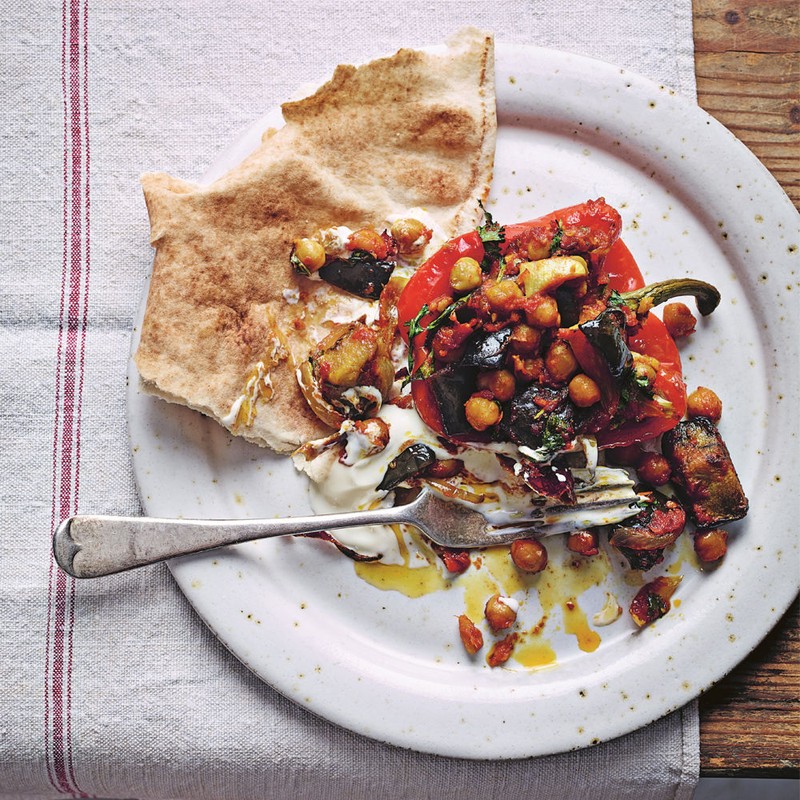
Red Pepper Stuffed With Spiced Chickpeas & Aubergine
Rosie Sykes, Roasting Pan Suppers
When peppers and tomatoes are abundant, this is a great dish to serve as a vegan main course or alongside meat or fish. Serve it either at room temperature or straight from the oven.
Preheat the oven to 190°C/170°C Fan/Gas mark 5, and put a roasting pan in to heat up.
Toss the aubergine and onions together with 1½ tablespoons of olive oil and plenty of seasoning. Once the oven is hot, add a splash of oil to the pan and swirl around. Add the aubergine and onions and shake to distribute them evenly. Roast for 15 minutes until the aubergine is golden and the onion has softened.
Sprinkle over the dry spices and return to the oven for a minute to let them toast. Add the chickpeas and then tip the mixture into a bowl, scraping with a spatula to ensure all the toasted spices come too, and set aside.
Turn the oven down to 180°C/160°C Fan/Gas mark 4. Place the peppers cavity-side down in the roasting pan, drizzle with olive oil and season well. Put in the oven for 10-20 minutes until softened but not cooked through.
Meanwhile, prepare the tomato sauce. Put the tomatoes, garlic and ginger in a blender and whizz until smooth.
Once the peppers have softened, remove them from the pan and set aside. Pour the tomato sauce into the hot pan. Turn the oven up to 220°C/200°C Fan/Gas mark 7. Return the pan to the oven to heat the sauce for about 5 minutes. Add the aubergine and chickpea mixture and cook for about 20 minutes until the sauce reduces down slightly. Once you are happy with the consistency, add a squeeze of lemon and three-quarters of the coriander and taste for seasoning. Set aside in a bowl while you rinse and dry the pan.
Add a splash of oil to the clean pan and put the peppers back in. Spoon the chickpea mixture into the peppers and bake until the peppers are soft, about 15-20 minutes. Serve with flatbreads and coconut yoghurt.
Visit Waterstones.com
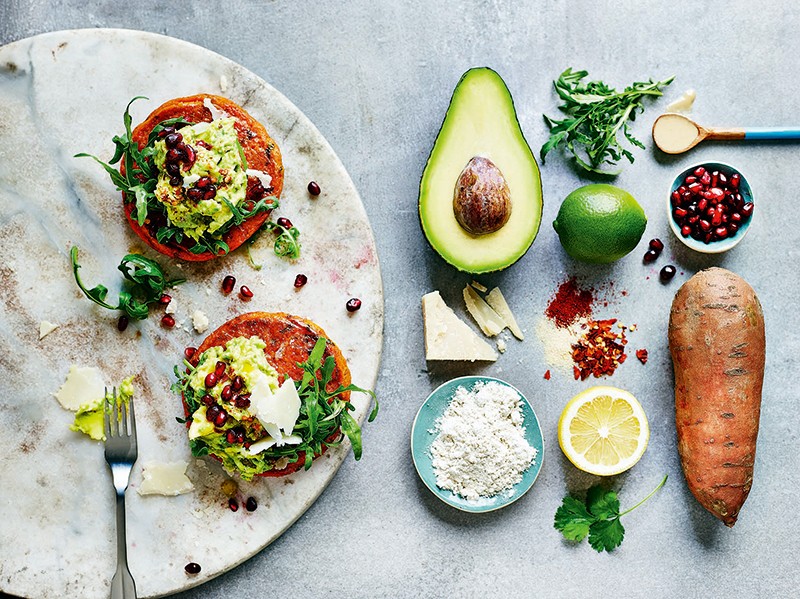
Sweet Potato Burgers With Smashed Avocado
Alice Living, Eat Well Every Day
This veggie twist on the classic burger is sure to satisfy both meat eaters and veggies alike. A great cook once and eat twice recipe, prep some delicious lunches with this soul-comforting food.
Preheat the oven to 180°C/Gas mark 4. Line a baking tray with greaseproof paper.
Chop the potato into small chunks. Put into a medium saucepan, cover with cold water, bring to the boil, then reduce the heat to low and simmer for 20 minutes, until cooked through. Drain and leave to steam dry.
In a large bowl, mix together the lemon juice, tahini, chilli flakes, smoked paprika, garlic powder, chopped coriander and spelt flour with a pinch of salt and pepper. Add the potato and mash with a potato masher until fully combined.
Once the mixture is cool enough to handle, use your hands to create two burgers. Place on the lined tray and cook in the hot oven for 20 minutes.
Meanwhile, put the avocado flesh into a bowl. Add the lime juice, a little salt and pepper and a pinch of chilli flakes and mash until fully combined.
Serve the burgers with a large handful of rocket. Top with the smashed avocado, sprinkle over the pomegranate seeds and use a vegetable peeler to shave over the parmesan.
Visit Waterstones.com
DISCLAIMER: We endeavour to always credit the correct original source of every image we use. If you think a credit may be incorrect, please contact us at info@sheerluxe.com.

